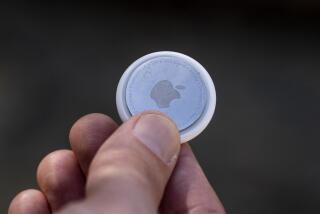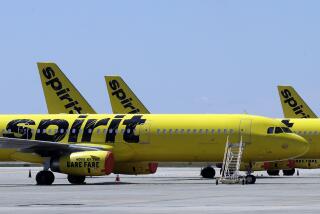Judge Backs Hughes in Suit Over Patent : Aerospace: Ruling against government in satellite case could mean the company will collect billions of dollars.
Hughes Aircraft Co. said Tuesday it has won a major victory against the U.S. government in a 20-year-old patent-infringement case, a decision that could result in the Los Angeles-based aerospace giant receiving billions of dollars in compensation.
James T. Turner, a U.S. Court of Claims judge in Washington, ruled late Monday that the government infringed on Hughes’ patent on an orbiting-control device by allowing other manufacturers to use the device on 84 satellites without paying royalties, Hughes said.
The device, called an attitude control system, helps keep satellites in geosynchronous orbit--virtually hovering over the same point on Earth. Hughes claims the technology made communications satellites practical in the early 1960s and thus spawned a multibillion-dollar industry.
“I view this as a very big victory,” said Victor G. Savikas, a Los Angeles lawyer who represents Hughes, one of the nation’s largest defense electronics and communications satellite firms.
The next step is for Turner to determine what damages and “delay compensation”--in effect, interest to cover the lost royalties and the lengthy court battle--the government must pay Hughes. The judge has indicated he will decide by year’s end, Hughes said.
The company, a unit of General Motors Corp., sought more than $3 billion in compensation and argued that 100 satellites were involved. The 84 satellites for which Turner found the government liable had a total value of between $3.6 billion and $4 billion, Hughes said.
Justice Department lawyers argue that Hughes is entitled to much smaller royalties.
Savikas refused to speculate on the size of the award. “Hughes says the royalty rate should be 15% (of the cost of the 84 satellites), but the government says the royalty rate should be 1%,” he said. “The delayed compensation also is a contentious issue.”
The patent is known around Hughes as the Williams patent because the device was invented in 1960 by Donald D. Williams, a Harvard-educated physicist and former Hughes employee.
The device used a single rocket thruster that could be timed to precisely fire so as to stabilize and control the position of a spinning satellite. Among the satellites covered in the Hughes case are those in the government’s Global Positioning System, a satellite network that provides navigational data for aircraft and ships.
In its lawsuit, filed in November, 1973, Hughes alleged that the government used the company’s patent on satellites produced by other contractors but was never compensated by the government.
General Motors Class H stock, which represents Hughes and the rest of GM’s Hughes Electronics group, rose 12.5 cents a share to close at $33.375 on the New York Stock Exchange on Tuesday.
*
The Associated Press contributed to this report.
More to Read
Inside the business of entertainment
The Wide Shot brings you news, analysis and insights on everything from streaming wars to production — and what it all means for the future.
You may occasionally receive promotional content from the Los Angeles Times.











